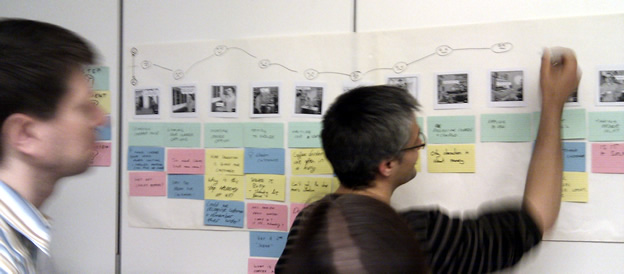I missed the start of SPA2010 on Sunday, I knew it was going to be a heavy week and I needed some time for the family 🙂 Sorry Phil/Adam.
Monday started with the opening plenary, I think it was good, I’m sure it was… it’s just that I was a bit distracted thinking about our impending workshop – would it work out?
Persona Driven Development – Can it work for you?
Phew! I think the answer is YES!! the Workshop was well attended with about 20 participants. We introduced Narrative Journey Maps (NJM) and how to create them. The everyone had a go. Prezzi the zooming infinite desktop type format worked well (thanks Sarah) and the materials seemed to be fit for purpose.
After the first exercise we introduced personas and the re-ran the scenario walking in the shoes of the personas on a ‘Discovery’ session. This generated lots of ideas and demonstrated how personas can focus effort and creativity and also unify a teams understanding of the motivations and needs of users.
Feedback on the workshop was very positive. Participants liked the narrative storytelling elements of NJMs and how they visualised a complete interaction flow, a number of participants mentioned that they could think of situations at their own organisations when they would experiment with them.

Most participants were aware of personas but had no direct experience of using them, again the feedback was positive and the proof of the power of personas was evident around the room and on the walls with all of the creative ideas and solutions that were generated.
WOW time to relax and have some lunch!
Pinocchio: on becoming a Lean Leader

This session was run by Portia Tung and Pascal Van Cauwenberghe. I wasn’t sure what to expect but as the story of Pinocchio was retold in whiteboard imagery one thing became clear – this was going to be fun.
By pulling examples from the story and focussing on the negatives and the positives (bad decisions made by Pinocchio made his nose grow)… by being strong and brave (and making good decisions) he was able to become a real boy etc.
Portia and pascal quickly took us from fairytale into corporate philosophies which was an exciting and demanding ride.
Here are some key takeaways:
Lean Leadership Tools:
- Visual controls – Use simple visual indicators to support Flow and Pull
- Standard Work – Adhere to work processes
- Daily accountability – Use visual controls to improve focus and drive improvement
- Leadership discipline – Set clear expectations and maintain focus
Tools of a learning Organisation:
- Nemawashi – Make decisions slowly based on consensus, implement decisions quickly
- Hansei – Relentless reflection
- Kaizen – Review regularly to establish a stable process and make incremental improvements
All of the above is guided by the long term philosophy: Grow and align the whole organisation towards a common purpose greater than purely a financial reward.
This was a fast paced journey that left me wanting to learn more about everything, but my little wooden head can only hold so much.
Apparently there is a whole series of Agile Fairytales, Pinocchio is the first in a new series of Lean Fairytales – go check!
Retrospectives Refactored
I haven’t had a chance to attend to many retrospectives I felt they were an excuse for developers to sit navel gazing. The few I have been to were actually very constructive and a great way to reconsider ways of doing things and set up new ways of doing things to try out next time.
Rachel Davies made the case for retrospectives as a key part of the ‘Agile way’ it was a great opportunity to learn from other organisations on how they run retrospectives and we all shared our good/bad experiences.
I think the key takeaways for me were:
- To ensure that there are actionable outcomes from retrospectives
- Only take on 2-3 actions for the next sprint
- Assign the actions (ideally people should volunteer)
- Allow TIME during the next sprint for the actions to get done
I also liked the idea of not having a retrospective after each sprint (as it becomes part of the mundane) and maybe having a bigger/longer retrospective after a big feature release of tranche of work or after every other sprint.
Taking these bigger retrospectives off-site was also seen as a good thing.
End users as software engineers – Good idea? Yes but no but…

The theme here from Helen Sharp and Lucy J Hunt was that with advancements in users technical knowledge and the development of simpler tools for software development… should end users be developing software?
There were so many pros and cons around this issue that I didn’t reach a clear verdict in my own mind, and I think this was the purpose to expose this conundrum.
You could argue about empowerment and that if a user has created some little software tool to help them get their job done then where is the harm in that.
But you can counter that there are many risks that this exposes. Who is responsible for supporting this software, the hidden costs, liabilities and data loss. The fact that only one person ‘knows the code’ etc. are all up for consideration. This is all before we got on to discussing the professionalism of software development and the unmaintainability of badly written code.
Some of the tools Helen and Lucy used in this workshop can be discovered on the Voluntary Service Overseas (VSO) website within their VSO Advocacy Toolkit.
